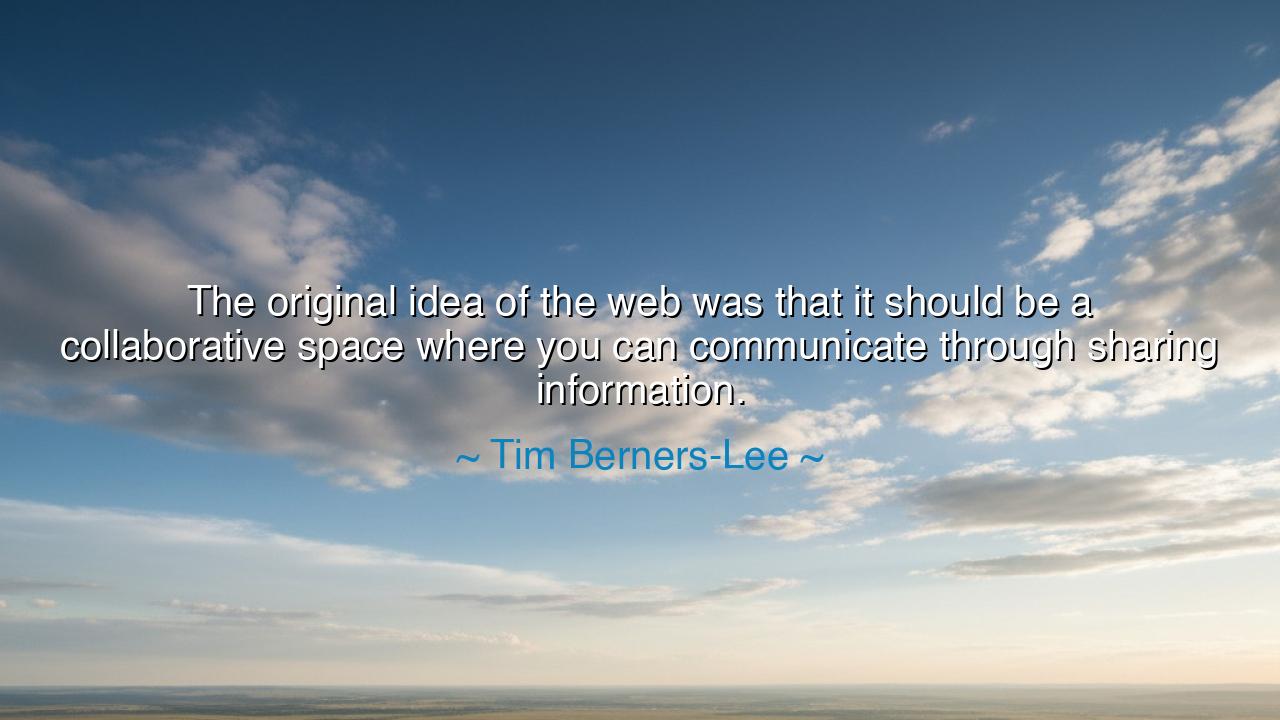
The original idea of the web was that it should be a
The original idea of the web was that it should be a collaborative space where you can communicate through sharing information.






Hear, O children of wisdom, the words of Tim Berners-Lee, the creator of the very system that has connected us all in ways unimaginable. He spoke thus: "The original idea of the web was that it should be a collaborative space where you can communicate through sharing information." These words carry with them not just a vision of technology, but a philosophy about the very nature of human connection and the power of shared knowledge. Berners-Lee envisioned the web not as a tool for individual gain, but as a platform for collective growth—a space where the exchange of information would be a shared endeavor, a means of connecting humanity across the vast distances of the earth.
At the heart of this vision is the idea of collaboration. The web was intended to be a space where knowledge would not be hoarded, but shared freely, a place where ideas, thoughts, and creations could pass from one mind to another, allowing each person to grow and build upon the knowledge of those who came before. This collaborative spirit is not merely a feature of the web but the very essence of human progress. For from the dawn of civilization, it has been through the exchange of ideas that humanity has risen from the shadows of ignorance into the light of understanding. The web, in its most pure form, embodies this ancient ideal: that the sharing of information is the foundation upon which knowledge and wisdom can be built.
Reflect, O children, on the great libraries of the ancient world, like the Library of Alexandria. That repository of knowledge was a beacon of wisdom, where the scrolls of countless scholars and thinkers were gathered together, allowing information to flow freely from one to another. Scholars would come from all corners of the earth to exchange ideas, to learn from each other, and to build upon the knowledge of their predecessors. In this spirit of collaboration, humanity advanced, as each generation stood upon the shoulders of the one before. The creation of the web, then, is but a continuation of this age-old practice of gathering, sharing, and building knowledge for the benefit of all.
But the web, as Berners-Lee envisioned it, is more than just a library of knowledge; it is a space of communication. It is a place where the voices of people from every corner of the world can come together, where ideas can be discussed, debated, and refined. Consider the philosophers of ancient Greece—Socrates, Plato, and Aristotle—who engaged in the great dialogues of their time, sharing their ideas with one another, challenging each other's assumptions, and seeking the truth together. The web, in its purest form, allows for the same kind of exchange, but on a global scale, where the voices of the many can come together to create a collective wisdom far greater than that which any individual or nation could achieve alone.
Yet, as we look upon the web today, we must acknowledge the truth that the vision of Berners-Lee is not fully realized. The web, which was meant to be a collaborative space, has at times become a platform for division, where the free flow of ideas is often drowned out by noise, disinformation, and malice. The pursuit of individual gain, in some quarters, has overshadowed the original ideal of shared knowledge. In the rush for power and profit, the ethos of collaboration has been compromised. The web, as we experience it today, is far from the ideal that Berners-Lee envisioned.
The lesson we must take from this, O children, is not just about technology, but about the values we bring to it. The web can only fulfill its true potential if it is shaped by the same ideals that have guided humanity through the ages: the pursuit of knowledge, the sharing of wisdom, and the collaboration for the common good. It is up to each of us to ensure that the web remains a space where the exchange of ideas is encouraged, where truth and understanding are valued above profit and division. We must use the web to connect, to build, and to create, not just for individual gain, but for the benefit of all humanity.
And so, O children, take this wisdom to heart: As you traverse the vast expanse of the digital world, remember that you are part of a global conversation, a conversation that has been taking place since the beginning of time. Seek to contribute to the sharing of knowledge, to the building of understanding, and to the fostering of collaboration. In doing so, you honor the vision of Berners-Lee and the ancient ideals that have always been the bedrock of human progress. Let the web be a tool for unity, a platform where the greatest minds and the smallest voices can come together to create a world of shared wisdom and collective advancement.






AAdministratorAdministrator
Welcome, honored guests. Please leave a comment, we will respond soon